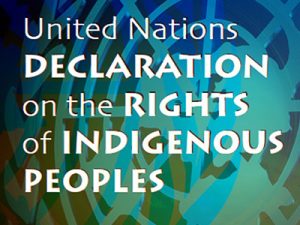Federal bill to implement UN Declaration a welcome step in the right direction

The Coalition for the Human Rights of Indigenous Peoples, a coalition of Indigenous peoples’ Nations and organizations and other human rights advocates, welcomes the tabling of Bill C-15, a federal government bill to implement the UN Declaration on the Rights of Indigenous Peoples.
Bill C-15 would provide a much-needed and long overdue framework for the federal government to work cooperatively with Indigenous peoples to implement the standards of, and rights affirmed in, the UN Declaration in law and policy.
Such implementation is the purpose of adopting human rights instruments like the UN Declaration.
Bill C-15 builds on Bill C-262, a Private Member’s Bill that was passed by the House of Commons in 2018 and which had broad public support, including grassroots Indigenous peoples. Bill C-262 would already be part of Canadian law except for stalling tactics that prevented a final vote in the Senate.
Because the core purpose of the new Bill is to provide a framework for implementation, much of the crucial work of setting priorities and reforming laws and policies will follow only after Bill C-15 is adopted into law. That makes its passage through the Parliamentary process that much more urgent. The Truth and Reconciliation Commission of Canada called the UN Declaration “the framework for reconciliation.” The work of implementation should have begun long ago.
Today, the need for effective measures to address systemic racism and uphold the rights of Indigenous peoples and for Canada to uphold its human rights commitments, has never been more urgent and critical.
The Coalition is urging all Parliamentarians to support the timely adoption of implementation legislation and to resist any efforts to obstruct the passage of the Bill for partisan reasons.
Background: Some key elements of Bill C-15
The purpose of the Act affirms the Declaration “as a universal international human rights instrument with application in Canadian law,” reflecting the reality that the Declaration is already being used by Canadian courts and tribunals to interpret Canadian laws.
The Bill states that a designated government Minister “must, in consultation and cooperation with Indigenous peoples and with other federal ministers, prepare and implement an action plan to achieve the objectives of the Declaration.”
Bill C-15 further states that such an action plan “must include measures to address injustices, combat prejudice and eliminate all forms of violence and discrimination, including systemic discrimination, against Indigenous peoples and Indigenous elders, youth, children, women, men, persons with disabilities and gender-diverse persons and two-spirit persons.”
The Bill includes important framing provisions in the preamble. For example, the bill repudiates all racist doctrines of superiority and rejects colonialism.
The preamble recognizes the “urgent need to respect and promote the rights of Indigenous peoples affirmed in treaties, agreements and other constructive arrangements.” It also states that “the Government of Canada recognizes that all relations with Indigenous peoples must be based on the recognition and implementation of the inherent right to self-determination, including the right of self-government.”
The preamble also notes that implementation “can contribute to supporting sustainable development and responding to growing concerns relating to climate change and its impacts on Indigenous peoples.”
The Coalition for the Human Rights of Indigenous Peoples (www.declarationcoaliton.ca)
This statement was endorsed by the following organizations and individuals:
- Amnesty International Canada / Amnistie Internationale Canada
- BC Assembly of First Nations
- BC Treaty Commission
- Canadian Friends Service Committee (Quakers)
- First Nations Summit
- Grand Council of the Crees (Eeyou Istchee) / Cree Nation Government
- KAIROS: Canadian Ecumenical Justice Initiatives
- Mennonite Church Canada, Indigenous-Settler Relations
- Dr. Wilton Littlechild, former Commissioner, Truth and Reconciliation Commission
- Dr. Sheryl Lightfoot, Canada Research Chair of Global Indigenous Rights and Politics, University of British Columbia
- Ellen Gabriel, Kanien’kehá:ka Activist from Kanehsatà:ke
- Professor Brenda Gunn, Faculty of Law, University of Manitoba








